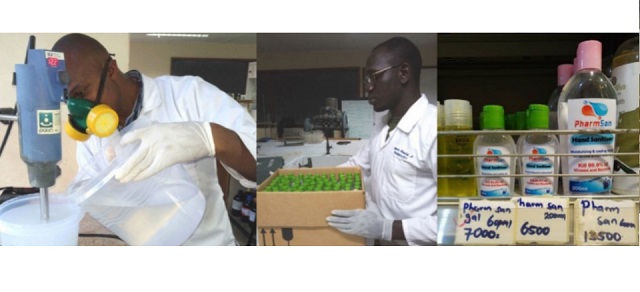
World Bank funds effort to produce WHO quality hand sanitisers
| THE INDEPENDENT | Scientists at the Mbarara University of Science & Technology (MUST) have started manufacturing hand sanitiser as part of their contribution to the government’s efforts to stop the spread of the coronavirus disease COVID-19.
The hand sanitisers are sold in supermarkets and pharmacies in Mbarara town at lower prices than others.
The sanitisers have also been donated to security staff at MUST, the Police force in Mbarara, and staff at Mbarara Regional Referral Hospital.
The government is promoting the use of hand sanitisers as one of the main measures to control the spread of COVID-19.
Members of the public are encouraged to wash hands regularly with soap and water or use hand saniters and to keep at least two meters apart in public and wearing a face mask.
On March 30, one week after the first coronavirus (COVID-19) case was confirmed in Uganda, the country of 43 million people went into a lockdown. As of June 9, the number of infected people has increased to 657 with 118 recovered and no deaths so far.
The hand sanitizer project is being run by the university’s (Pharm-Biotechnology and Traditional Medicine (PHARMBIOTRAC), a World Bank-funded Africa Center of Excellence (ACE). PHARMBIOTRAC has been instrumental in providing their expertise to the government by being an integral part of the scientific task force.
The center leader, Dr. Casim Umba Tolo runs a new project, PharmSan Innovations dedicated to manufacturing of the quality hand sanitisers.
As soon as Uganda registered its first COVID-19 case in March, PHARMBIOTRAC assembled a team to formalise PharmSan Innovations and fast-track the production of hand sanitisers.
With increasing demand and growing prices, there was an urgent need for the center to develop a product that followed World Health Organisation (WHO) guidelines and was also affordable for the local population.
PharmSan is a result of rigorous trial formulations and critical quality control measures, and an optimum formula that is in accordance with the Uganda National Bureau of Standards (UNBS) supported by the center’s Chair for Innovation & Business Management, Eng. Anke Weisheit.
PHARMBIOTRAC was established in 2017 at MUST to address the challenges of low life expectancy and productivity due to communicable and non-communicable diseases, through “building a critical mass of specialised and skilled human resource that can advance traditional medicine and Pharm-Biotechnology for socio-economic development of Africa”.
The Eastern and Southern Africa Higher Education Centers of Excellence Project (ACE II) is an innovative regional higher education operation targeting 8 countries Ethiopia, Kenya, Malawi, Mozambique, Rwanda, Tanzania, Uganda, Zambia.
The Project aims at strengthening the capacity of higher education institutions to deliver quality post-graduate education and collaborative research. With a competitive and transparent process involving independent evaluation of international experts, 24 centers in 5 regional priority cluster areas of industry, agriculture, health, education and applied statistics have been selected from the 8 participating countries.
The ACE II is funded by a US$148 million International Development Association (IDA) credit from the World Bank targeting the 24 Centers of Excellence. The ACEII Project is being coordinated and managed by a regional facilitation unit (RFU), the Inter-University Council of East Africa (IUCEA), under a Regional Steering Committee which comprises of heads of higher education of the ministries of education. Each ACEII center is headed by a center leader and staffed with key personnel necessary for project implementation.
According to Maulshree Gangwar, an Education Consultant in the Education Global Practice of the World Bank, and Roberta Malee Bassett, who is a Global Lead for Tertiary Education and Senior Education Specialist providing leadership and technical expertise for projects at the World Bank, the COVID-19 pandemic has offered an opportunity to build experience in emergency response and to innovate using minimal resources.
“The team at PHARMBIOTRAC has been innovative in finding ways through unique non institutional resource pooling like private funds and fundraising campaigns,” the say in an online article, “Even though this project was not planned within existing budgets, they are extremely important in responding to this pandemic and in the long run, contributing to increasing industrial development, job creation and economic growth for Uganda and the region.”
The goal of this initiative is to continue providing inexpensive and high-quality hand sanitizers to the local population, which are usually in short supply. Being a university project, the overall legal entity is MUST with the ACE being the biggest stakeholder in this innovation.
The ACE is discussing opportunities to form a legal company with regulatory bodies and ACE management. The move is being celebrated as a perfect example of spin off from science to practice, and income generation.
****
 The Independent Uganda: You get the Truth we Pay the Price
The Independent Uganda: You get the Truth we Pay the Price


